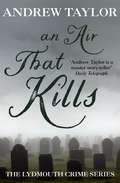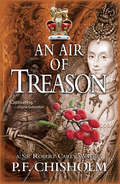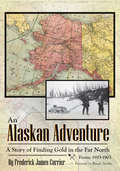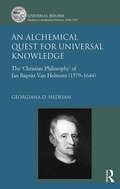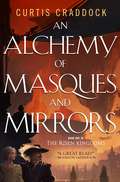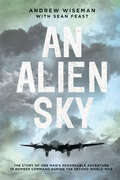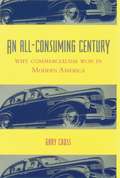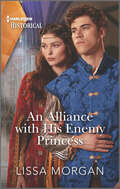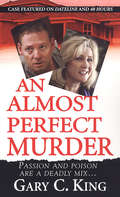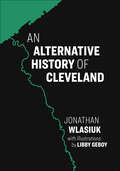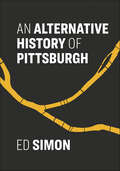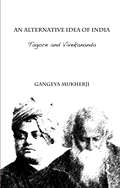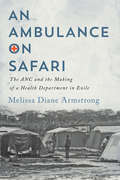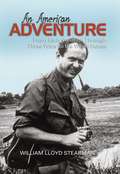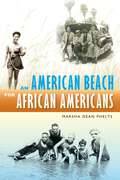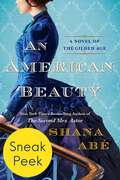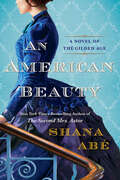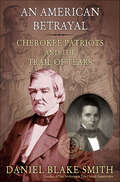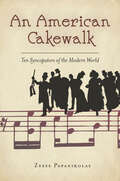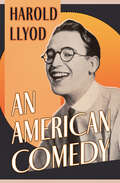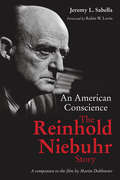- Table View
- List View
An Air That Kills: The Lydmouth Crime Series Book 1
by Andrew Taylor'Andrew Taylor is a master story-teller' Daily TelegraphFrom the No.1 bestselling author of The Ashes of London and Fire of Court, this is the first instalment in the acclaimed Lydmouth seriesWorkmen in the small market town of Lydmouth are demolishing an old cottage. A sledgehammer smashes into what looks like a solid wall. Instead, layers of wallpaper conceal the door of a locked cupboard which holds a box - and in the box is the skeleton of a young baby. Items within the box suggest that the baby was entombed early in the nineteenth century, but when another man is also found dead, the evidence suggests that the baby's death is more recent and that a killer is on the loose. For Journalist Jill Francis, newly arrived from London, this looks like her first story to chase ... 'The most under-rated crime writer in Britain today' Val McDermid'Captures perfectly the drab atmosphere and cloying morality of the 1950s . . . Taylor is an excellent writer. He plots with care and intelligence and the solution to the mystery is satisfyingly chilling'The Times 'There is no denying Taylor's talent, his prose exudes a quality uncommon among his contemporaries' Time Out 'Andrew Taylor is a master story-teller' Daily Telegraph
An Air of Glory
by Sarah NeilanIt is the year 1801. Polly Forster is a beautiful but penniless Northumbrian girl who longs to escape from a stifling, unhappy existence as a companion to a miserly spinster cousin. And now her chance has come. The romantic and mysterious man she has met at the home of a friend has charged her with a dangerous mission--to carry an urgent and unknown message to the last remaining Jacobites among the Scottish settlers in Nova Scotia. In a moment of mad passion she accepts the charge--and his offer of a rendezvous in Canada and a promise of marriage. Polly embarks on the Agnes MacVeagh, a sailing ship bound for Pictou, Nova Scotia, with a cargo of refugees from the Highland Clearances in Scotland. But on the hazardous voyage Polly is assailed by doubts. New friends have opened wider vistas for her, and unexpected incidents force her to question her reckless actions and her relationship with Lucian, a man whom she barely knows. Does he really love her? What will happen if he breaks his word? What is in the Jacobite letter? And how much does the British government agent on the ship, the handsome, fascinating yet enigmatic Augustus Fenwick, know about Polly's curious involvement in a treasonable enterprise that is punishable by hanging? Polly must discover the answers to these and many other questions before the perilous voyage is ended if she is to find the happiness she seeks in the new world.
An Air of Treason: A Sir Robert Carey Mystery (Sir Robert Carey Series #6)
by P F ChisholmAfter his hair-raising adventures in London, Sir Robert Carey has finally tracked down Queen Elizabeth, who orders him to investigate the most dangerous cold case of her reign - the mysterious 1560 death of Amy Dudley (née Robsart), unloved wife of Robert Dudley, Earl of Leicester. Some thirty years back, the late Dudley was Elizabeth's favorite suitor and potential husband. The Queen has since been one of the most obvious suspects in arranging Amy's murder. This makes Carey deeply uneasy with his sleuthing role. Then someone manages to poison Carey with belladonna, which temporarily blinds him. Worse still, the steadfast Sergeant Dodd has disappeared on the road from London. As the Queen's scandalous past collides with her magnificent State entrance into Oxford, can Carey rally in time to find both Dodd and the true murderer of Amy Robsart?
An Alaskan Adventure: A Story of Finding Gold in the Far North From: 1893-1903
by Frederick James CurrierAs the descendant of early miners, a grandfather who prospected for gold in the Fairbanks area in 1908 and a father who mined from the 1920s through the early 1940s, my interest and fascination with Frederick Currier's manuscript was easily spiked. Currier's quest for gold from 1893 into the 1900s was an admirable pursuit. His account of prospecting ventures in 1898 on the Chena River near Fairbanks is spellbinding, especially in his use of a sternwheeler and his building of cabins as he prospected toward the headwaters. I have great admiration for the early gold prospectors like Frederick Currier since I have sunk a couple of shafts to bedrock with a windlass and know the effort and determination required. The power of a few nuggets can change a person's direction in life. Currier's, An Alaskan Adventure, is well worth reading—more than once.
An Album of Maya Architecture (Native American)
by Tatiana ProskouriakoffMagnificent guide presents 36 sites from Central America and southern Mexico as they appeared more than a thousand years ago: Temple of the Cross, Palenque; Acropolis and Maya sweat bath, Piedras Negras; Red House and north terrace at Chichén Itzá; more. Each illustration features text of archeological finds and line drawing of remains. 95 illustrations.
An Album of Memories: Personal Histories from the Greatest Generation
by Tom BrokawA seventeen-year-old who enlisted in the army in 1941 writes to describe the Bataan Death March. Other members of the greatest generation describe their war — in such historic episodes as Guadalcanal, the D-Day invasion, the Battle of the Bulge, and Midway — as well as their life on the home front. In this beautiful American family album of stories, reflections, memorabilia, and photographs, history comes alive and is preserved, in people’s own words and through photographs and time lines that commemorate important dates and events. Starting with the Depression and Pearl Harbor, on through the war in Europe and the Pacific, this unusual book preserves a people’s rich historical heritage and the legacy of the heroism of a nation.
An Alchemical Quest for Universal Knowledge: The ‘Christian Philosophy’ of Jan Baptist Van Helmont (1579-1644) (Universal Reform: Studies in Intellectual History, 1550-1700)
by Georgiana D. HedesanHistory of science credits the Flemish physician, alchemist and philosopher Jan Baptist Van Helmont (1579-1644) for his contributions to the development of chemistry and medicine. Yet, as this book makes clear, focussing on Van Helmont's impact on modern science does not do justice to the complexity of his thought or to his influence on successive generations of intellectuals like Robert Boyle or Gottfried Leibniz. Revealing Van Helmont as an original thinker who sought to produce a post-Scholastic synthesis of religion and natural philosophy, Georgiana Hedesan reconstructs his ambitious quest for universal knowledge as it emerges from the text of the Ortus medicinae (1648). Published after Van Helmont's death by his son, the work can best be understood as a compilation of finished and unfinished treatises, the historical product of a life unsettled by religious persecution and personal misfortune. The present book provides a coherent account of Van Helmont's philosophy by analysing its main tenets. Divided into two parts, the study opens with a background to Van Helmont's concept of an alchemical Christian philosophy, demonstrating that his outlook was deeply grounded in the tradition of medical alchemy as reformed by Theophrastus von Hohenheim, called Paracelsus (1493-1541). It then reconstitutes Van Helmont's biography, while giving a historical dimension to his intellectual output. The second part reconstructs Van Helmont's Christian philosophy, investigating his views on God, nature and man, as well as his applied philosophy. Hedesan also provides an account of the development of Van Helmont's thought throughout his life. The conclusion sums up Van Helmont's intellectual achievement and highlights avenues of future research.
An Alchemy of Masques and Mirrors: Book One in the Risen Kingdoms (The Risen Kingdoms #1)
by Curtis CraddockA delightful and engrossing fantasy debut featuring an intelligent heroine and her guardian, a royal musketeer.In a world of soaring continents and bottomless skies, where a burgeoning new science lifts skyships into the cloud-strewn heights, and ancient blood-borne sorceries cling to a fading glory, Princess Isabelle des Zephyrs is about to be married to a man she has barely heard of, the second son of a dying king in an empire collapsing into civil war.Born without the sorcery that is her birthright but with a perspicacious intellect, Isabelle believes her marriage will stave off disastrous conflict and bring her opportunity and influence. But the last two women betrothed to this prince were murdered, and a sorcerer-assassin is bent on making Isabelle the third. Aided and defended by her loyal musketeer, Jean-Claude, Isabelle plunges into a great maze of prophecy, intrigue, and betrayal, where everyone wears masks of glamour and lies. Step by dangerous step, she unravels the lies of her enemies and discovers a truth more perilous than any deception.At the Publisher's request, this title is being sold without Digital Rights Management Software (DRM) applied.
An Alien Sky: The Story of One Man's Remarkable Adventure in Bomber Command During the Second World War
by Sean Feast Andy WisemanThe legendary RAF bomber who survived the infamous Stalag 3 POW camp recounts his WWII experiences in this military memoir. Growing up in Berlin just as Adolf Hitler was coming to power, Andrew Wiseman escaped to Poland with is family when he was thirteen. He later made his way to England where he joined the Royal Air Force, training first as a pilot and then as an air bomber in South Africa. Joining No. 466 squadron, he flew Handley Page Halifax heavy bombers in a handful of operations before being shot down in Occupied France. Wiseman spent the next year as a prisoner of war in Nazi prison camp Stalag Luft III, where he used his knowledge of Russian, Polish and German to act as a camp interpreter. Taking part in the prison break known as the Great Escape, Wiseman acted as a scrounger for the X committee who dug the tunnel. Moved from camp to camp, he was one of those forced into the Long March when the Germans attempting to escape the Russian advance. He later played a key role in avoiding bloodshed when the Russians refused to allow British and Norwegian prisoners to return home—a role for which he was later recognized by the King of Norway. Co-written with the acclaimed aviation historian Sean Feast, Andrew Wiseman&’s wartime memoir is a vivid chronicle of courage, service and survival through the Second World War.
An All-Consuming Century: Why Commercialism Won in Modern America
by Gary CrossThe unqualified victory of consumerism in America was not a foregone conclusion. The United States has traditionally been the home of the most aggressive and often thoughtful criticism of consumption, including Puritanism, Prohibition, the simplicity movement, the '60s hippies, and the consumer rights movement. But at the dawn of the twenty-first century, not only has American consumerism triumphed, there isn't even an "ism" left to challenge it. An All-Consuming Century is a rich history of how market goods came to dominate American life over that remarkable hundred years between 1900 and 2000 and why for the first time in history there are no practical limits to consumerism.By 1930 a distinct consumer society had emerged in the United States in which the taste, speed, control, and comfort of goods offered new meanings of freedom, thus laying the groundwork for a full-scale ideology of consumer's democracy after World War II. <P><P>From the introduction of Henry Ford's Model T ("so low in price that no man making a good salary will be unable to own one") and the innovations in selling that arrived with the department store (window displays, self service, the installment plan) to the development of new arenas for spending (amusement parks, penny arcades, baseball parks, and dance halls), Americans embraced the new culture of commercialism—with reservations. However, Gary Cross shows that even the Depression, the counterculture of the 1960s, and the inflation of the 1970s made Americans more materialistic, opening new channels of desire and offering opportunities for more innovative and aggressive marketing. The conservative upsurge of the 1980s and '90s indulged in its own brand of self-aggrandizement by promoting unrestricted markets. The consumerism of today, thriving and largely unchecked, no longer brings families and communities together; instead, it increasingly divides and isolates Americans.Consumer culture has provided affluent societies with peaceful alternatives to tribalism and class war, Cross writes, and it has fueled extraordinary economic growth. The challenge for the future is to find ways to revive the still valid portion of the culture of constraint and control the overpowering success of the all-consuming twentieth century.
An Alliance with His Enemy Princess
by Lissa MorganA high-stakes, Medieval enemies to lovers story.A royal decreeThat will change their lives… Norman knight Rolant Guyarde has come to conquer a Welsh fort, but when he meets its mistress, he realizes she&’s the sword-wielding &“soldier&” he fought en route! Despite their being enemies, he finds himself intrigued by the brave, beautiful Princess Gwennan. When they&’re forced into an uneasy alliance, Rolant helps her petition the king for her parents&’ release from prison. But in exchange for their freedom, the king demands a price neither Rolant nor Gwennan expects!From Harlequin Historical: Your romantic escape to the past.
An Almost Perfect Murder
by Gary C. KingA critical care nurse marries his patient&’s widow only to later poison her in this true crime story by the author of Stolen in the Night.A Woman with A Passion For Power . . .Kathy Marie Augustine was not out to make friends. In politics, she rose to the top by playing hardball—and pushing her way through the old boy&’s network of the Nevada legislature, rising to the rank of State Controller. When she died, only a few people shed tears—including the man who killed her.A Killer with A Foolproof Plan . . .Chaz Higgs was a former body-builder turned intensive care nurse who saw wealthy, sexy Kathy Marie Augustine as his meal-ticket—until he couldn&’t stomach her domineering personality any longer. When Chaz decided he&’d had enough, he chose a poison that would leave no evidence behind.Murder Hidden in Plain Sight . . .The death of a nationally-known politician made headlines, but one slip of the tongue came to the attention of a determined Nevada detective. Now, true-crime master Gary C. King takes us into the extraordinary life and death of a famously ambitious woman politician, behind the scenes of the investigation that unearthed shocking secrets, and into the heart and mind of a man who nearly got away with the perfect crime . . .Includes Sixteen Pages of Revealing Photos
An Alternative History of Cleveland
by Jon WlasiukDive into Cleveland&’s deep past and return with a new vision for how we should think about the region today. The land we call &“northeast Ohio&” was originally forged through eons of glacial pressure, geologic shifts, and the relentless movement of the Cuyahoga River. Since the last Ice Age, however, it has also been transformed countless times by the many people who have called it home. In An Alternative History of Cleveland, Jon Wlasiuk uncovers the mysteries, devastations, and human incursions that have shaped the region. Here, you&’ll encounter the giant megafauna that roamed the area until their mysterious extinction, Indigenous civilizations who first shaped the land and harnessed its natural resources, industrial pioneers like John D. Rockefeller and Charles Brush who corralled electricity and crude oil in the service of capitalist progress, the environmental devastation that polluted the Cuyahoga and caused toxic algae blooms in Lake Erie, and the numerous Clevelanders today who want to reshape the city&’s relationship with the natural environment. Though separated by thousands of years, these stories contain a common theme: the city of Cleveland remains bound to nature, despite our best efforts to liberate ourselves from its limits. Part natural history, part archeological essay, and part a contemporary call to arms to reclaim and rewild Cleveland&’s future, this unforgettable trek into the heart of &“the Land&” will change the way you see the city forever. Praise for An Alternative History of Cleveland: "A stunning accomplishment." —Dr. John Grabowski, editor, Encyclopedia of Cleveland History "Wlasiuk is a dazzling storyteller, weaving the threads that connect ancient swamps to the Agora, or giant sloths to Public Square, all in the service of illuminating the inextricable tether we have to the plants, animals, and waterways around us." —Raechel Anne Jolie, author of Rust Belt Femme"I read Jon Wlasiuk&’s marvelous deep-time history of Cleveland with a sense of awe. A story of place that&’s this well-done, this accessible to the public, and with this sort of fascinating arc through time is going to rearrange the furniture in every reader&’s head." —Dan Flores, New York Times best-selling author of Wild New World and Coyote America
An Alternative History of Pittsburgh
by Ed Simon&“[An] epic, atomic history of the Steel City . . . a work of literature, a series of linked creative nonfiction essays, an historical story cycle.&” ―Phillip Maciak, Los Angeles Review of Books The land surrounding the confluence of the Allegheny, Monongahela, and Ohio rivers has supported communities of humans for millennia. Over the past four centuries, however, it has been transformed countless times by the many people who call it home. In this brief, lyrical, and idiosyncratic collection, Ed Simon, a staff writer at The Millions, follows the story of Pittsburgh through a series of interconnected segments, covering all manner of beloved people, places, and things, including: • Paleolithic Pittsburgh • The Whiskey Rebellion • The attempted assassination of Henry Frick • The Harmonists • The Mystery, Pittsburgh&’s radical, Black nationalist newspaper • The myth of Joe Magarac • Billy Strayhorn, Duke Ellington, Andy Warhol, and much, much more. Accessible and funny, An Alternative History of Pittsburgh is a must-read for anyone curious about this storied city, and for Pittsburghers who think they know it all too well already. &“[A] rich and idiosyncratic history . . . Even Pittsburgh history buffs will learn something new.&” —Publishers Weekly &“Simon tells the story of the city and all the changes that made it what it is today in a way that's entirely new, by the hand of someone who is deeply familiar.&” ―Juliana Rose Pignataro, Newsweek &“A sparkling new take on everyone&’s favorite Rust Belt metropolis.&” ―Justin Velluci, Jewish Chronicle &“A brilliant look at how geology and art, politics and religion, disaster and luck combine to build America&’s great cities―one that will leave you wondering what secrets your own hometown might be hiding.&” ―Anjali Sachdeva, author of All the Names They Used for God
An Alternative Idea of India: Tagore and Vivekananda
by Gangeya MukherjiThis book attempts to unravel the worldview of two prominent Indians of recent Indian history — Tagore and Vivekananda. Both suggested emancipation through political struggles but without transgressing the boundaries of humanism. This is significant, as identifying an enemy was an intrinsic part of nationalistic formulations. The larger philosophy of life, for Tagore and Vivekananda, was to reach out across geographical borders.In this work, their alternative idea of India is analysed in the larger context of the many formulations of nationalism with special reference(s) to theoretical as well as literary works in European and Indian contexts. The author brings on board critiques that have emerged recently —secularist, feminist and postcolonial — and defends his subjects against them. This book is essentially an intellectual interrogation of two eminent thinkers of their time, and falls within the rubric of intellectual history.
An Ambulance on Safari: The ANC and the Making of a Health Department in Exile (McGill-Queen's/Associated Medical Services Studies in the History of Medicine, Health, and Society #53)
by Melissa Diane ArmstrongDuring the apartheid era, thousands of South African political activists, militants, and refugees fled arrest by crossing into neighbouring southern African countries. Although they had escaped political oppression, many required medical attention during their period of exile. An Ambulance on Safari describes the efforts of the African National Congress (ANC) to deliver emergency healthcare to South African exiles and, in the same stroke, to establish political legitimacy and foster anti-apartheid sentiment on an international stage. Banned in South Africa from 1960 to 1990, the ANC continued its operations underground in anticipation of eventual political victory, styling itself as a "government in waiting." In 1977 it created its own Health Department, which it presented as an alternative medical service and the nucleus of a post-apartheid healthcare system. By publicizing its own democratic policies as well as the racist practices of healthcare delivery in South Africa, the Health Department won international attention for its cause and provoked widespread condemnation of the apartheid state. While the global campaign was unfolding successfully, the department's provision of healthcare on the ground was intermittent as patients confronted a fledgling medical system experiencing various growing pains. Still, the legacy of the department would be long, as many medical professionals who joined the post-apartheid Department of Health in South Africa had been trained in exile during the liberation struggle. With careful attention to both the international publicity campaign and on-the-ground medical efforts, An Ambulance on Safari reveals the intricate and significant political role of the ANC's Health Department and its influence on the anti-apartheid movement.
An American Adventure
by William Lloyd StearmanA memoir of extraordinary scope, William Lloyd Stearman's reminiscences will attract those interested in early aviation, World War II in the Pacific, life as a diplomat behind the Iron Curtain, the Vietnam War, and the ins and outs of national security decision making in the White House. Stearman begins with a description of his childhood as the son of aviation pioneer Lloyd Stearman. He then covers his naval combat experiences in the Pacific War and later struggles as one of the Navy's youngest ship captains. Following graduate school, he moved to the front lines of the Cold War and writes about his life as a diplomat who negotiated with the Soviets, spent nine years in Berlin and Vienna, and was director of psychological operations against North Vietnam. His reflections on seventeen years with the National Security Council at the White House are of special interest.
An American Airman in Paris: Stories of Love and the Great War
by Beatriz WilliamsNew York Times bestselling author Beatriz Williams introduces Octavian Rofrano, from her forthcoming new novel, A Certain Age, in this short story about a lonely American pilot in 1920s Paris and those he's never forgotten.Octavian Rofrano has never met the girl whose photograph was his constant companion through the long days and nights of the Great War. The promises he made to himself and that far-away image in the silence of his cockpit have never left him, but the anguish and loneliness of post-Armistice Paris has crept into his bones. One night, Octavian finally decides to lose himself in the sad beauty the City of Lights offers, but as reminders of that 11th day of November fill his mind, can he let go of past hopes or does the promise of salvation still have a hold on him?Originally published in the moving collection Fall of Poppies: Stories of Love and The Great War, this e-book also includes an excerpt from Williams' new novel, A Certain Age, coming in June 2016.
An American Beach for African Americans
by Marsha Dean PheltsIn the only complete history of Florida’s American Beach to date, Marsha Dean Phelts draws together personal interviews, photos, newspaper articles, memoirs, maps, and official documents to reconstruct the character and traditions of Amelia Island’s 200-acre African American community. In its heyday, when other beaches grudgingly provided only limited access, black vacationers traveled as many as 1,000 miles down the east coast of the United States and hundreds of miles along the Gulf coast to a beachfront that welcomed their business.Beginning in 1781 with the Samuel Harrison homestead on the southern end of Amelia Island, Phelts traces the birth of the community to General Sherman’s Special Field Order No. 15, in which the Union granted many former Confederate coastal holdings, including Harrison’s property, to former slaves. She then follows the lineage of the first African American families known to have settled in the area to descendants remaining there today, including those of Zephaniah Kingsley and his wife, Anna Jai.Moving through the Jim Crow era, Phelts describes the development of American Beach’s predecessors in the early 1900s. Finally, she provides the fullest account to date of the life and contributions of Abraham Lincoln Lewis, the wealthy African American businessman who in 1935, as president of the Afro-American Life Insurance Company, initiated the purchase and development of the tract of seashore known as American Beach. From Lewis’s arrival on the scene, Phelts follows the community’s sustained development and growth, highlighting landmarks like the Ocean-Vu-Inn and the Blue Palace and concluding with a stirring plea for the preservation of American Beach, which is currently threatened by encroaching development.In a narrative full of firsthand accounts and "old-timer" stories, Phelts, who has vacationed at American Beach since she was four and now lives there, frequently adopts the style of an oral historian to paint what is ultimately a personal and intimate portrait of a community rich in heritage and culture.
An American Beauty: A Novel of the Gilded Age Inspired by the True Story of Arabella Huntington Who Became the Richest Woman in the Country
by Shana AbeBe one of the first to read this sneak preview sample edition!For fans of HBO&’s The Gilded Age and readers of Marie Benedict, Karen Harper, and Ellen Marie Wiseman, this sweeping novel of historical fiction from New York Times, Wall Street Journal, and USA Today bestselling author Shana Abé is inspired by the true story of Arabella Huntington—a charismatic, complex woman born to poverty who became one of the most powerful and wealthy figures of her time.1867, Richmond, Virginia: Though she wears the same low-cut purple gown that is the uniform of all the girls who work at Worsham&’s gambling parlor, Arabella stands apart. It&’s not merely her statuesque beauty and practiced charm. Even at seventeen, Arabella possesses an unyielding grit, and a resolve to escape her background of struggle and poverty. Collis Huntington, railroad baron and self-made multimillionaire, is drawn to Arabella from their first meeting. Collis is married and thirty years her senior, yet they are well-matched in temperament, and flirtation rapidly escalates into an affair. With Collis&’s help, Arabella eventually moves to New York, posing as a genteel, well-to-do Southern widow. Using Collis&’s seed money and her own shrewd investing instincts, she begins to amass a fortune. Their relationship is an open secret, and no one is surprised when Collis marries Arabella after his wife&’s death. But &“The Four Hundred&”—the elite circle that includes the Astors and Vanderbilts—have their rules. Arabella must earn her place in Society—not just through her vast wealth, but with taste, style, and impeccable behavior. There are some who suspect the scandalous truth, and will blackmail her for it. And then there is another threat—an unexpected, impossible romance that will test her ambition, her loyalties, and her heart . . . An American Beauty brings to vivid life the glitter and drama of a captivating chapter in history—and a remarkable woman who lived by her own rules.
An American Beauty: A Novel of the Gilded Age Inspired by the True Story of Arabella Huntington Who Became the Richest Woman in the Country
by Shana Abe"Abé is an exquisite storyteller." —Fiona Davis, New York Times bestselling author of The Magnolia PalaceThe New York Times bestselling author of The Second Mrs. Astor returns with a spellbinding new book perfect for fans of HBO&’s The Gilded Age and readers of Marie Benedict, Karen Harper, and Allison Pataki. This sweeping novel of historical fiction is inspired by the true rags-to-riches story of Arabella Huntington—a woman whose great beauty was surpassed only by her exceptional business acumen, grit, and artistic eye, and who defied the constraints of her era to become the wealthiest self-made woman in America. 1867, Richmond, Virginia: Though she wears the same low-cut purple gown that is the uniform of all the girls who work at Worsham&’s gambling parlor, Arabella stands apart. It&’s not merely her statuesque beauty and practiced charm. Even at seventeen, Arabella possesses an unyielding grit, and a resolve to escape her background of struggle and poverty. Collis Huntington, railroad baron and self-made multimillionaire, is drawn to Arabella from their first meeting. Collis is married and thirty years her senior, yet they are well-matched in temperament, and flirtation rapidly escalates into an affair. With Collis&’s help, Arabella eventually moves to New York, posing as a genteel, well-to-do Southern widow. Using Collis&’s seed money and her own shrewd investing instincts, she begins to amass a fortune. Their relationship is an open secret, and no one is surprised when Collis marries Arabella after his wife&’s death. But &“The Four Hundred&”—the elite circle that includes the Astors and Vanderbilts—have their rules. Arabella must earn her place in Society—not just through her vast wealth, but with taste, style, and impeccable behavior. There are some who suspect the scandalous truth, and will blackmail her for it. And then there is another threat—an unexpected, impossible romance that will test her ambition, her loyalties, and her heart . . . An American Beauty brings to vivid life the glitter and drama of a captivating chapter in history—and a remarkable woman who lived by her own rules.&“This story of one woman&’s ascent offers a fascinating look at the choices she made to become a Gilded Age titan.&”— Kirkus Reviews
An American Betrayal: Cherokee Patriots and the Trail of Tears
by Daniel Blake SmithThe fierce battle over identity and patriotism within Cherokee culture that took place in the years surrounding the Trail of TearsThough the tragedy of the Trail of Tears is widely recognized today, the pervasive effects of the tribe's uprooting have never been examined in detail. Despite the Cherokees' efforts to assimilate with the dominant white culture—running their own newspaper, ratifying a constitution based on that of the United States—they were never able to integrate fully with white men in the New World.In An American Betrayal, Daniel Blake Smith's vivid prose brings to life a host of memorable characters: the veteran Indian-fighter Andrew Jackson, who adopted a young Indian boy into his home; Chief John Ross, only one-eighth Cherokee, who commanded the loyalty of most Cherokees because of his relentless effort to remain on their native soil; most dramatically, the dissenters in Cherokee country—especially Elias Boudinot and John Ridge, gifted young men who were educated in a New England academy but whose marriages to local white girls erupted in racial epithets, effigy burnings, and the closing of the school.Smith, an award-winning historian, offers an eye-opening view of why neither assimilation nor Cherokee independence could succeed in Jacksonian America.
An American Cakewalk: Ten Syncopators of the Modern World
by Zeese PapanikolasThe profound economic and social changes in the post-Civil War United States created new challenges to a nation founded on Enlightenment and transcendental values, religious certainties, and rural traditions. Newly-freed African Americans, emboldened women, intellectuals and artists,and a polyglot tide of immigrants found themselves in a restless new world of railroads, factories, and skyscrapers where old assumptions were being challengedand new values had yet to be created. InAn American Cakewalk: Ten Syncopators of the Modern World, Zeese Papanikolas tells the lively and entertaining story of a diverse group of figures in the arts and sciences who inhabited this new America. Just as ragtime composers subverted musical expectations by combining European march timing with African syncopations, so this book's protagonists--who range from Emily Dickinson toThorstein Veblen and from Henry and William James to Charles Mingus--interrogated the modern American world through their own "syncopations" of cultural givens. The old antebellum slave dance, the cakewalk, with its parody of the manners and pretensions of the white folks in the Big House, provides a template of how the tricksters, shamans, poets, philosophers, ragtime pianists, and jazz musicians who inhabit this book used the arts of parody, satire, and disguise to subvert American cultural norms and to create new works of astonishing beauty and intellectual vigor.
An American Comedy
by Harold Lloyd Wesley W. StoutThis autobiography by an influential silent film star gives an insider&’s view of the motion picture industry in the early twentieth century. It&’s one of the most enduring images in film history: a young man in circular glasses, dangling from the hands of a clock high above Los Angeles. The actor performing this daring stunt was Harold Lloyd, a highly successful comedian from the silent film era. Lloyd made nearly two hundred comedies, both silent and &“talkies,&” between 1914 and 1947. He is best known for his &“Glass&” character, a bespectacled everyman who captured the mood of the 1920s. In this fascinating autobiography, which was written just around the time sound was revolutionizing cinema, Lloyd chronicles his experiences as a performer and producer of silent films, preserving firsthand details of Hollywood&’s bygone period. This extraordinary memoir, originally published in 1928, discusses actors both comedic and dramatic, stage to film adaptations, producers, directors, and primarily, how early silent movies were made. It is a must-read for film historians and movie buffs alike.
An American Conscience: The Reinhold Niebuhr Story
by Jeremy L. SabellaReinhold Niebuhr (1892–1971) was an inner-city pastor, ethics professor, and author of the famous Serenity Prayer. Time magazine's 25th anniversary issue in March 1948 featured Niebuhr on its cover, and Time later eulogized him as "the greatest Protestant theologian in America since Jonathan Edwards." Cited as an influence by public figures ranging from Billy Graham to Barack Obama, Niebuhr was described by historian Arthur Schlesinger Jr. as "the most influential American theologian of the twentieth century." In this companion volume to the forthcoming documentary film by Martin Doblmeier on the life and influence of Reinhold Niebuhr, Jeremy Sabella draws on an unprecedented set of exclusive interviews to explore how Niebuhr continues to compel minds and stir consciences in the twenty-first century. Interviews with leading voices such as Jimmy Carter, David Brooks, Cornel West, and Stanley Hauerwas as well as with people who knew Niebuhr personally, including his daughter Elisabeth, provide a rich trove of original material to help readers understand Niebuhr's enduring impact on American life and thought.CONTRIBUTORS (interviewees) Andrew J. Bacevich David Brooks Lisa Sowle Cahill Jimmy Carter Gary Dorrien Andrew Finstuen K. Healan Gaston Stanley Hauerwas Susannah Heschel William H. Hudnut III Robin W. Lovin Fr. Mark S. Massa, SJ Elisabeth Sifton Ronald H. Stone Cornel West Andrew Young
